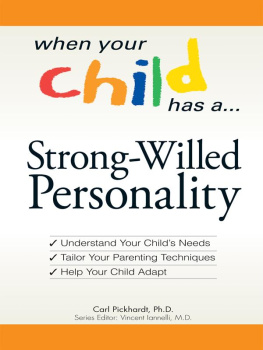

Strong-Willed
Personality
 Understand Your Childs Needs
Understand Your Childs Needs
 Tailor Your Parenting Techniques
Tailor Your Parenting Techniques
 Help Your Child Adapt
Help Your Child Adapt
Carl Pickhardt
Series Editor: Vincent Iannelli, M.D.

Copyright 2008 Simon and Schuster.
All rights reserved.
This book, or parts thereof, may not be reproduced in any
form without permission from the publisher; exceptions are
made for brief excerpts used in published reviews.
Published by
Adams Media, an imprint of Simon & Schuster, Inc.
57 Littlefield Street, Avon, MA 02322. U.S.A.
www.adamsmedia.com
Contains materials adapted and abridged from The EverythingParents
Guide to the Strong-Willed Child, by Carl Pickhardt, copyright 2005
Simon and Schuster., ISBN 13: 978-1-59337-381-8, ISBN 10:
1-59337-381-3.
ISBN 13: 978-1-59869-763-6
ISBN 10: 1-59869-763-3
eISBN: 978-1-44051-578-1
Printed in Canada.
J I H G F E D C B A
Library of Congress Cataloging-in-Publication Data
is available from the publisher.
This publication is designed to provide accurate and authoritative information with regard to the subject matter covered. It is sold with the understanding that the publisher is not engaged in rendering legal, accounting, or other professional advice. If legal advice or other expert assistance is required, the services of a competent professional person should be sought.
From a Declaration of Principles jointly adopted by
a Committee of the American Bar Association
and a Committee of Publishers and Associations
This book is available at quantity discounts for bulk purchases.
For information, please call 1-800-289-0963.
Contents
Introduction
by Vincent Iannelli
Although parents often seek help when they have a picky eater or poor sleeper, they often try to go it alone when their child has discipline and behavior problems.
They may stick to their own previously tried and true discipline techniques or go from one breakthrough program to another, without any success.
Unfortunately, while many kids are easy to discipline, eager to please, and sometimes do well even as you make parenting mistakes, with the strong-willed child you have to be more flexible and adapt your method of parenting to your child.
This can be quite surprising to the new parents who read about all of the traditional parenting techniques and thought they were prepared to their raise their child. Parents who already have one or more easygoing children and then have a strong-willed child come along can be in for an even bigger surprise as they continue to try the discipline methods that worked with their first children but no longer seem to be working anymore.
Their initial surprise quickly leads to frustration, as their strong-willed child almost seems to take over the family. His tantrums and demands may get so bad that it makes eating out at a restaurant, going to a store, or even visiting family or friends a big chore.
It is at this point, but hopefully before, that parents seek help. When Your Child Has a... Strong-Willed Personality is a great resource for parents who need help parenting their strong-willed child.
In addition to helping you understand why your child may be so strong-willed, Dr. Pickhardt shows you how to get back in charge of your household. His book teaches you how to handle discipline, conflict, and how to avoid overreacting when your strong-willed child doesnt listen.
From the basics of what to say during a tantrum and how to help your child work in a group of children to teaching your child to be more patient, When Your Child Has a... Strong-Willed Personality will give you all of the tools you need to parent your strong-willed child.
While it is the perfect book for strong-willed children and other hard-to-discipline children, including kids with ADHD, it is also a great resource for any parent who wants to learn more about basic discipline techniques and avoid overparenting.
Chapter 1
Is Your Child Strong-Willed?
Ten Things You Will Learn in This Chapter
How to tell if your infant may be a willful child.
When children start to act out, purposefully, and why.
What happens when a stubborn child and stubborn parent clash.
How following through on your word is extremely important.
About the four propositions of independence.
How distraction can be a valuable tool.
About the hidden meaning behind the question why?
How a willful child often only gets worse with age.
How to deal with your child who demands immediate gratification.
About first-born children and their interesting perspectives of family
The Issue of Want
To begin to appreciate how willful children can be a handful for parents, it may be helpful to consider the six Ws of willfulnesswant, wont, why, win, when, and whose. Around each of these issues, parents of a willful child frequently find themselves hard-pressed.
Although most parents know the basics of what their baby requiresfood, rest, diaper changes, comforting, playtime, sleep, soothing words, affectionate touch, for exampleonly the baby knows exactly when he wants those needs met. Some babies are flexible, easily scheduled, and soon satisfied, quickly coming to adjust to the timing, kind, and amount of parental care being given. Living on parental terms seems to work okay for the child because, by and large, the child goes with the parental program without complaining.
Other babies, however, are less content with this standard schedule. Operating on their own schedule, they loudly let it be known when a want is unsatisfied, and they signal intense and protracted distress until it is met. They also signal to parents that a strong-willed child has arrived into their care. She just keeps fussing and crying until we give her what she wants. She wont give up! In willful children, where theres a will, theres a want.
Now parents wonder, Maybe we shouldnt respond to every cry if the more often she complains, the more often we give her what she wants. After all, we dont want to spoil her. Besides, shes supposed to live on our terms. Were not supposed to live on hers. So the parents decide to let the infant cry herself down after they have already settled her in bed three times, and after half an hour of wailing, the exhausted child finally does give in to sleep. Now shes learned whos in charge, conclude the parents, although it sure is hard hearing her be that unhappy for that long.
DOES THIS SOUND LIKE YOUR CHILD?
Because willful children are so strongly wed to what they want, they will often be impulsively shortsighted, focusing on immediate desire instead of long-term interest. It is the parents job to extend the willful childs vision, to think ahead about possible costs and risks, to delay what is wanted and consider what is right and wise.
Next page













 Understand Your Childs Needs
Understand Your Childs Needs Tailor Your Parenting Techniques
Tailor Your Parenting Techniques Help Your Child Adapt
Help Your Child Adapt